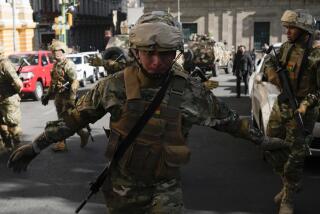Colombia Rebels Bar Access to Zone
- Share via
BOGOTA, Colombia — Heavily armed rebel fighters blocked Colombia’s front-running presidential candidate from entering their southern haven Saturday, casting new doubts on the viability of peace talks.
Liberal candidate Horacio Serpa had planned to lead about 2,000 supporters by bus right into the heart of the zone, which was ceded to the Revolutionary Armed Forces of Colombia, or FARC, three years ago.
The so-called demilitarized zone was created as a venue for peace talks, but critics say it has allowed the FARC to improve its military position while negotiations founder.
Once inside the Switzerland-size swath of land, Serpa was expected to lead a rally against ongoing rebel abuses there.
The plan unraveled, however, on a dirt road near the hamlet of Balsillas, just outside rebel territory.
Video footage taken by journalists showed Serpa descending from his bus with supporters who waved white handkerchiefs, and then gathering spikes that had been thrown in the convoy’s path.
Rebels with automatic rifles at their hips warned the protesters to turn back, and white banners drawn across the road warned of land mines and car bombs farther ahead.
“This aggressive and stupid behavior by the FARC demonstrates their complete lack of consistency where the peace process is concerned,” said Serpa, reached by telephone as he retreated to the nearby city of Neiva. “If the guerrillas don’t want peace, I’m going to be their adversary.”
The blockade also moved President Andres Pastrana to indignation Saturday.
In what seemed at first to be a strong act of defiance against the FARC, the president said he would preside over a meeting of political leaders smack in the middle of the rebel haven today. Later in the evening, however, he canceled the trip.
“With this attitude, the FARC are putting their word and their will for peace in doubt,” Pastrana said in a strongly worded communique. “The demilitarized zone can not be off limits for any democratic event. The FARC are newly mistaken with this daring act.”
A presidential press officer said Pastrana had given no reason for the sudden change of plans but seemed to be acting on advice from his security team.
Besides holding halfhearted peace talks in the zone, the FARC has been using the area to hide kidnapping victims, traffic arms, recruit minors and process cocaine, officials say.
Just last month, the military arrested three Irish Republican Army suspects who were leaving the zone’s de facto capital, San Vicente del Caguan, with false passports. Prosecutors charge that the trio spent five weeks at a nearby camp teaching rebels to make explosives.
The blockade came just days before Pastrana must decide whether to extend the term of the FARC’s southern haven, due to expire Saturday.
Even before Serpa’s run-in with the rebels, pressure was mounting for the president to deny the extension unless the FARC makes some kind of peace gesture. In the three years since Pastrana set aside the zone as a “laboratory for peace,” negotiations have stalled, fighting has escalated, and public patience has worn thin.
“There is no sovereignty in Colombia. There is the law of the jungle, imposed by the FARC,” said Jorge Visval, the president of Colombia’s ultra-right cattle ranching federation, which has long opposed the haven.
Visval refers to the haven as a “zone on loan,” and he says the rebel army shouldn’t be allowed to stay there unless it agrees to release all its kidnapping victims, halt abductions and lay down its arms.
“Colombia is not Switzerland,” he said. “We need war legislation. We need money for the military.”
Most Colombians take a less bellicose approach, but almost everyone seems to agree that the FARC should offer some kind of concession if the zone is to remain in its hands. This could mean, for example, allowing a delegation of international human rights monitors to set up shop within the zone.
The demilitarized zone at the heart of this dispute blankets 16,200 square miles of tropical lowlands and has become virtually a state within a state.
Rebel fighters conduct security checks on roads leading into and out of the area and keep close tabs on residents.
Even Pastrana, traveling to the FARC haven seven months ago, was forced to leave his security detail at home and entrust his safety to hundreds of FARC foot soldiers instead.
More to Read
Sign up for Essential California
The most important California stories and recommendations in your inbox every morning.
You may occasionally receive promotional content from the Los Angeles Times.










